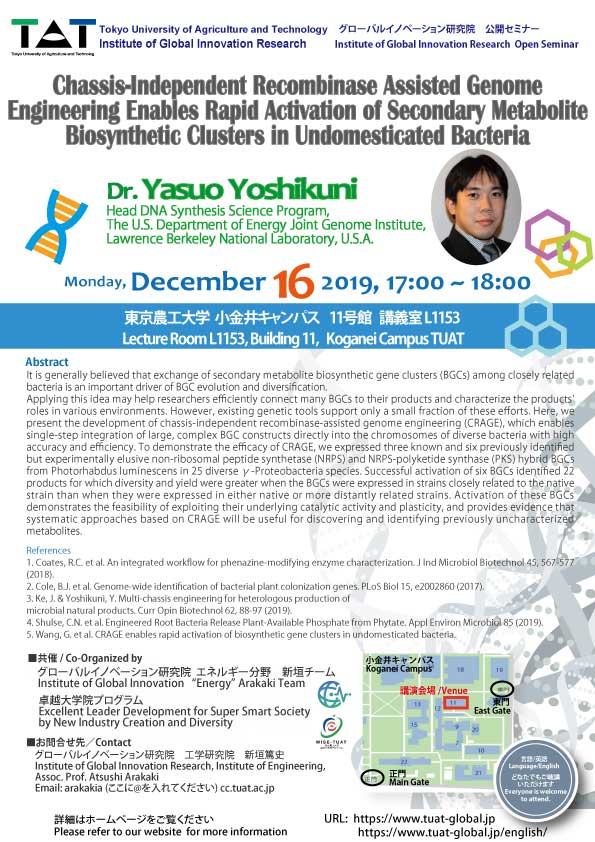Event
【GIR Open Seminar】 Dr. Yasuo Yoshikuni / Lawrence Berkeley National Laboratory (U.S.A.) “Chassis-Independent Recombinase Assisted Genome Engineering Enables Rapid Activation of Secondary Metabolite Biosynthetic Clusters in Undomesticated Bacteria”

| Date | 2019.12.16 (17:00 - 18:00) |
|---|---|
| Venue | |
| Title | Dr. Yasuo Yoshikuni (Head DNA Synthesis Science Program, The U.S. Department of Energy Joint Genome Institute, Lawrence Berkeley National Laboratory, U.S.A.) "Chassis-Independent Recombinase Assisted Genome Engineering Enables Rapid Activation of Secondary Metabolite Biosynthetic Clusters in Undomesticated Bacteria" 〈Abstract〉 It is generally believed that exchange of secondary metabolite biosynthetic gene clusters (BGCs) among closely related bacteria is an important driver of BGC evolution and diversification. Applying this idea may help researchers efficiently connect many BGCs to their products and characterize the products’ roles in various environments. However, existing genetic tools support only a small fraction of these efforts. Here, we present the development of chassis-independent recombinase-assisted genome engineering (CRAGE), which enables single-step integration of large, complex BGC constructs directly into the chromosomes of diverse bacteria with high accuracy and efficiency. To demonstrate the efficacy of CRAGE, we expressed three known and six previously identified but experimentally elusive non-ribosomal peptide synthetase (NRPS) and NRPS-polyketide synthase (PKS) hybrid BGCs from Photorhabdus luminescens in 25 diverse γ-Proteobacteria species. Successful activation of six BGCs identified 22 products for which diversity and yield were greater when the BGCs were expressed in strains closely related to the native strain than when they were expressed in either native or more distantly related strains. Activation of these BGCs demonstrates the feasibility of exploiting their underlying catalytic activity and plasticity, and provides evidence that systematic approaches based on CRAGE will be useful for discovering and identifying previously uncharacterized metabolites. 〈References〉 1. Coates, R.C. et al. An integrated workflow for phenazine-modifying enzyme characterization. J Ind Microbiol Biotechnol 45, 567-577 (2018). 2. Cole, B.J. et al. Genome-wide identification of bacterial plant colonization genes. PLoS Biol 15, e2002860 (2017). 3. Ke, J. & Yoshikuni, Y. Multi-chassis engineering for heterologous production of microbial natural products. Curr Opin Biotechnol 62, 88-97 (2019). 4. Shulse, C.N. et al. Engineered Root Bacteria Release Plant-Available Phosphate from Phytate. Appl Environ Microbiol 85 (2019). 5. Wang, G. et al. CRAGE enables rapid activation of biosynthetic gene clusters in undomesticated bacteria. Nat Microbiol (2019). |
| Language | English |
| Intended for | Everyone is welcome to attend. |
| Co-Organized by | Institute of Global Innovation “Energy” Arakaki Team Excellent Leader Development for Super Smart Society by New Industry Creation and Diversity |
| Outline | |
| Contact | Institute of Global Innovation Research, Institute of Engineering Assoc. Prof. Atsushi Arakaki e-mail: arakakia (at) cc.tuat.ac.jp |
このページの上部へ